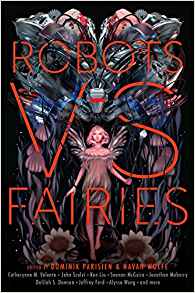Gary K. Wolfe Reviews Robots vs Fairies edited by Dominik Parisien & Navah Wolfe
 Robots vs Fairies, Dominik Parisien & Navah Wolfe, eds. (Saga 978-1-4134-6236-5, $27.99, 384pp, hc) January 2018.
Robots vs Fairies, Dominik Parisien & Navah Wolfe, eds. (Saga 978-1-4134-6236-5, $27.99, 384pp, hc) January 2018.
It certainly started long before Holly Black and Justine Larbalestier’s Zombies vs. Unicorns anthology a few years ago, and before the movie Batman vs. Superman turned a game kids had been playing for a half-century into gloomy sludge, and it probably even dates back before things like King Kong vs. Godzilla. But I suspect it was really the Twilight series that turned the whole “choose your team” business into a full-on mass-culture bus crash, when we were all supposed to choose between Team Edward and Team Jacob (sadly, Team Kill Them All wasn’t an option). Now Dominik Parisien & Navah Wolfe, on the heels of their award-winning anthology The Starlit Wood, have asked an impressive roster of contributors to take sides in Robots vs Fairies, a far more whimsical conceit, even though a few of the stories, such as those by Jim C. Hines and Sarah Gailey, are decidedly grim in some particulars. Fortunately, the contributors weren’t specifically tasked with depicting actual contests between robots and fairies; that would have resulted in dietetically hazardous levels of twee, and besides, Catherynne M. Valente effectively takes care of it in “A Fall Counts Anywhere”, one of the two funniest pieces here, describing a WWE-style smashup presented in contrasting narrative voices that sound like a monster truck rally radio ad and an NPR commentator. Another purely comic piece is John Scalzi’s “Three Robots Experience Objects Left Behind from the Era of Humans for the First Time”, which, as its title suggests, revisits an old SF trope, but with hilarious results (the objects, by the way, are a ball, a sandwich, a cat, an Xbox, and a nuclear missile). Ken Liu’s “Quality Time” is a sharp and witty satire of Silicon Valley culture, as a humanities major tries to make his mark in an innovation-crazed tech company, first with rat-chasing robots that evoke the Pied Piper and later with robot nannies, though both schemes backfire in ways that illustrate the classic SF theme of unanticipated consequences.
Most of the stories, like Scalzi’s, make no effort to combine the contrasting liminal figures of the book’s title, although a few make nods in that direction with metaphor, allusion, or setting, or deliberately straddle the line between SF and fantasy. The lead story is Seanan McGuire’s “Build Me a Wonderland”, which at first seems to be about ever-more-sophisticated animatronics in a Disney-like theme park, though it’s not hard to guess that, Twilight Zone-style, real elves are going to be involved. The title figure in Annalee Newitz’s “The Blue Fairy’s Manifesto” is actually a drone who tries to liberate and radicalize the robots, especially one called RealBoy, in a toy factory; while the allusions to Pinocchio are obvious, it’s essentially a thoughtful variation on the purely SF theme of machine autonomy (also a central theme of Newitz’s Autonomous, reviewed here in September). Pinocchio is also evoked in Lavie Tidhar’s “The Buried Giant”, probably the most moving and haunting tale in the collection, as a young boy leaves his home town – actually an elaborate simulation in which he’s the only resident – to discover the dangerous wider world, with hazards such as the fierce robot “manshonyaggers” (borrowed from Cordwainer Smith). The story gains resonance by being told at two removes, as the narrator recalls hearing the tale in his distant childhood. There is, oddly enough, a similarly elegiac tone with some of the other robots here. Jonathan Maberry’s “Ironheart” concerns an injured veteran on a failing farm in a post-apocalyptic mid-21st century, handicapped by his own artificial heart, yet hoping to resurrect some obsolete farming robots left in his barn. One of the main characters in Alyssa Wong’s “All the Time We’ve Left to Spend”, set in Japan’s aidoru culture, is the robot simulacrum of a singer ten years dead, but still the emotional focus of a living acolyte. The coming to identity of a robot elder care worker in Madeleine Ashby’s “Work Shadow/Shadow Work” is set in the Icelandic culture of hidden folk and witches. Two other SF tales, Maria Dahvana Headley’s “Adriftica” and Max Gladstone’s “To a Cloven Pine”, allude to Shakespearian fairies from A Midsummer Night’s Dream and The Tempest, respectively, while Mary Robinette Kowal’s “Sound and Fury”, though drawing a title from Shakespeare, is a pretty basic confrontation between a giant robot and a giant alien squid.
On the purely fantasy side of the ledger, the most accomplished story here is Jeffrey Ford’s “The Bookcase Expedition”, in which the narrator, a version of Ford himself “whacked out on meds,” watches the epic struggle of a band of tiny fairies to reach the top of his bookcase, with clever allusions to some of the titles they pass en route. If good fantasy is the impossible closely observed, this is as pure an example of it as Ford’s earlier fairy story, “The Annals of Eelin-Ok”. I was also impressed by Jim C. Hines’s “Second to the Left, and Straight On”, which begins as a missing-child mystery, shifts into what at first seems a comic tale of a disillusioned Tinker Bell having turned into a child abductor, and finally turns into a genuinely moving lyrical tale of loss, as the narrator begins to unfold secrets about herself.
In Sarah Gailey’s rather dark “Bread and Milk and Salt”, a fairy takes the form of animals to repeatedly visit the boy Peter as he grows up, only to discover the adult Peter has become something of a mad scientist whose cruel experiments come to involve the fairy itself. Perhaps a bit more sentimental, but also moving, is Tim Pratt’s “Murmured Under the Moon”, a tale of a fairy librarian – an attractive conceit in its own right – faced with finding a book she cannot retrieve. Kat Howard’s “Just Another Love Song” offers the irresistible idea of a banshee as a street busker, while Delilah S. Dawson’s “Ostentation of Peacocks”, set in the world of her Lila Bowen Shadow novels, playfully pits the shapechanging trickster Nettie Lonesome against Billy the Kid and his gang. After each story, the author adds a brief note, sometimes declaring allegiance to Team Robot or Team Fairy, but along the way offering insights that together add up to an interesting conversation about the nature of SF and fantasy. One of the most provocative is Tim Pratt’s point that robots become more interesting the more they resemble humans, while fairies grow more interesting the less they are like us. That seems to imply the tension on the string that ties together this whole disparate but highly enjoyable collection of tales.
Gary K. Wolfe is Emeritus Professor of Humanities at Roosevelt University and a reviewer for Locus magazine since 1991. His reviews have been collected in Soundings (BSFA Award 2006; Hugo nominee), Bearings (Hugo nominee 2011), and Sightings (2011), and his Evaporating Genres: Essays on Fantastic Literature (Wesleyan) received the Locus Award in 2012. Earlier books include The Known and the Unknown: The Iconography of Science Fiction (Eaton Award, 1981), Harlan Ellison: The Edge of Forever (with Ellen Weil, 2002), and David Lindsay (1982). For the Library of America, he edited American Science Fiction: Nine Classic Novels of the 1950s in 2012, with a similar set for the 1960s forthcoming. He has received the Pilgrim Award from the Science Fiction Research Association, the Distinguished Scholarship Award from the International Association for the Fantastic in the Arts, and a Special World Fantasy Award for criticism. His 24-lecture series How Great Science Fiction Works appeared from The Great Courses in 2016. He has received six Hugo nominations, two for his reviews collections and four for The Coode Street Podcast, which he has co-hosted with Jonathan Strahan for more than 300 episodes. He lives in Chicago.
This review and more like it in the January 2018 issue of Locus.








